-

新人教版高中英语必修3Unit 4 Space Exploration-Listening&Speaking&Talking教学设计一
Listening and Speaking introduces the topic of “talking about how to become an astronaut”. This period is aimed to inform students some details about the requirements of being an astronaut. Students can be motivated and inspired by the astronauts. Teachers ought to encourage students to learn from them and let them aim high and dream big.Listening and Talking introduces the theme of "talk about life in space". This part also informs students more details about life in space and can inspire students to be curious about this job. 1. Guide students to listen for numbers concerning dates, years and ages etc2. Cultivate students' ability to talk about how to become an astronaut and life in space ; 3. Instruct students to use functional sentences of the dialogue such as “ first of all, I am not sure, so what might be .. I guess.. I wonder…I am curious…)appropriately.1. Guide students to understand the content of listening texts in terms of the whole and key details; 2. Cultivate students' ability to guess the meaning of words in listening; discuss with their peers how to become a qualified astronaut and describe the life in space.Part 1: Listening and SpeakingStep 1: Lead inPredictionThe teacher can ask students to predict what the listening text is about by looking at the pictures.About how to become an astronaut./the requirements of an astronautStep 2: Then, play the radio which is about an interview a. And after finishing listening for the first time, the students need to solve the following tasks.

新人教版高中英语必修3Unit 4 Space Exploration-Discovering Useful Structure教学设计
The theme of the section is “Describe space facts and efforts to explore space”. Infinitives are one of non-finite verbs, as the subjects, objects, predicative, attributes and adverbials. This unit is about space exploration, which is a significant scientific activity, so every scientific activity has strong planning. Therefore, using the infinitives to show its purpose, explanations or restrictions is the best choice.1. Learn the structure, functions and features of infinitives.2. Learn to summarize some rules about infinitives to show purpose and modify.3. Learn to use infinitives in oral and writing English. 1. Learn the structure, functions and features of infinitives.2. Learn to summarize some rules about infinitives to show purpose and modify.3. Learn to use use infinitives in oral and writing English.Step 1 Lead in---Pair workLook at the following sentences and focus on the italicized infinitives. In pairs, discuss their functions. 1. I trained for a long time to fly airplanes as a fighter pilot..(作目的状语)2. As we all know, an astronaut needs to be healthy and calm in order to work in space..(作目的状语)3. First of all, you must be intelligent enough to get a related college degree..(作目的状语)4. Some scientist were determined to help humans realise their dream to explore space..(作定语)5. On 12 April 1961, Yuri Gagarin became the first person in the world to go into space..(作定语)Summary:1. 不定式的结构:to+do原形。2. 分析上面的句子,我们知道在描述太空探索时,动词不定式不仅可以用来表目的,还可以用来作定语,表修饰。

新人教版高中英语必修3Unit 4 Space Exploration-Reading and Thinking教学设计一
Q4: What is the function of the International exploration ?Having astronauts from different countries on boardQ5: What can you learn from Para 4 ?China has made great achievements in exploring spaceQ6: What is the attitude to the space exploration ?SupportiveStep 6 Post reading---RetellPeople have always wanted to learn more about space. Before the mid-20th century, most people felt (1)_________ (travel) into space was an impossible dream. However, (2)____ the help of scientists, peoplesucceeded in realizing their dream (3) _________ (explore) space. On 4 October 1957, the Sputnik 1 satellite (4) ____________(launch) by the USSR. (5) ________________ scientists try to make sure nothing goes wrong, accidents can still happen. These disasters made everyone(6)___________(disappoint), but people still believe in the importance of (7) ________(carry) on space exploration. In 2003, China became the third country to (8)_____________ (independent) send humans into space. Then Shenzhou 6 and 7 completed (9)____ second manned orbit and the first Chinese spacewalk. In spite of the difficulties, scientists hope future (10)__________ (discovery) will not only enable us to understand the universe but also help us survive well into the future.Answers: 1. travelling 2. with 3. to explore 4. was launched 5. Although6. disappointed 7. carrying 8. independently 9. a 10. discoveriesStep 6 Post reading---Critical thinkingQ1: What do you think of the space exploration ? I think it is beneficial to us. Through further study of space, people will make full use of it in the future, such as the space experiments by Wang Yaping in Tian Gong 1.Q2: If you are determined to be an astronaut, what should you prepare at present ?First of all, I should study hard to get a related college degree. Besides, I must keep mental and physical healthy.Step 7. HomeworkTry to summarize the structure of the article by a mind map.

新人教版高中英语必修3Unit 4 Space Exploration-Reading For Writing教学设计一
另一方面,其余的人反对这个计划,因为它可能会导致一些不好的影响。7.I hold the belief that space exploration not only enable us to understand how the universe began but also help us survived well into the future.我坚信探索太空不仅能够使我们了解宇宙的起源而且能够帮助我们更好地走进未来。8.I think we should spend more time and money exploring space so as to provide new and better solutions to people's shortterm and longterm problems.为了给人类的短期和长期问题提供更新和更好的解决方法,我认为我们应该花更多的时间和金钱来探索太空。9.From my point of view,it is wrong of young people to depend on their telephones too much,which may do harm to both their physical and mental health.在我看来,年轻人过度依赖手机是不对的,因为它们可能会对他们的身心健康都有害。最近你班同学就“人类是否应该进行宇宙探索”这个问题进行了激烈的讨论。有人认为,探索宇宙不仅让人类更好地了解宇宙的发展,还可以用来指导农业生产,以及把一些探索太空的高新技术用于现实生活;也有一些人认为探索太空花掉了大量的人力物力;影响了人们的生活水平。请你根据以下情况写一篇报告并发表自己的观点。注意:1.写作内容应包括以上全部要点,可适当发挥,使上下文连贯;

新人教版高中英语必修3Unit 5 The Value of Money- Discovering Useful Structure教学设计
Step 3 Meaning1. 过去将来时表示从过去某一时间来看将要发生的动作或存在的状态, 常用在宾语从句中。一般由“would/should +动词原形”构成。She hoped that they would meet again someday. 她希望将来有一天他们能再见面。2. was/were going to+动词原形: 表示过去将要发生或很有可能发生的动作, 常用于口语中, 表示预言、意图或者打算等。He was going to start work the following week. 他打算下星期开始工作。3. was/were about to do: 常用来表示即将发生的动作, “刚要/正要做……”。注意该结构不与任何时间状语连用。I felt that something terrible was about to happen. 我感到某种可怕的事情即将发生。4.was/were to do: 表示“曾计划做某事”, 如果表示“本来计划做某事, 动作没实现”, 则需用 “was/were to have done”。She said she was to have told me about the accident. 她说她本来想告诉我关于事故的事。5.Start, go, come, leave, see, meet等动词的过去进行时: 表示就过去某一时刻而言即将发生的动作。She was coming later. 她随后就来。I had just put on my overcoat and was leaving to visit a friend of mine. 我刚穿上外套要去看我的一个朋友。

新人教版高中英语必修3Unit 5 The Value of Money-Listening &Speaking&Talking教学设计
4. A:We’d like to have someone to say a word at the beginning to welcome the group.B:↙Who?A:We thought that you or Dr.Johnson might do it.B用降调说Who,其意思是问,对方想让谁在开场时致欢迎词。Step 6 Pronunciation---Practice1. Listen to the short conversation and mark the intonation with ↗, ↙ or ↙, ↗. Then discuss with a partner what they intend to convey by using different intonation.Owner: You know what ?↗ It’s a million-pound bank note↙.Waiter 1: Really ?↗(question)Waiter 2: Really !↙(unbelievable and surprised)Waiter 3: Really ?!↙↗(first question then surprised)2. Listen to the conversations. Underline the parts that are stressed and mark the intonation. Then talk about the implied meanings of the responses with different intonations. Listen again and repeat.1) Henry: It’s a nice suit.Owner: Oh, it’s perfect!↙(The intonation means it is very suitable for Henry.)2) Henry: Well, that’s very kind of you.Owner: Kind, sir ?↗(what you said is not right) No, it’s kind of you. You must come whenever you want and have whatever you like. Just having you sit here is a great honour !!↙(welcome you to come again)3)Henry:Well, to be honest, I have none. Oliver:(happily) What luck!(excited) Brother↗, what luck!↙(It means “Didn’t you hear it?”)Henry: Well, it may seem lucky to you but not to me!↗(angry) If this is your idea of some kind of joke, I don’t think it’s very funny. Now if you’ll excuse me, I ought to be on my way.↙(If so, I would leave.)Roderick: Please don’t go↙...(hope Henry can wait for a moment)Part B Viewing and Talking---Describe people’s changing attitudes in a film clipStep 1 Before-listening---Tell the filmYou are going to watch part of the film The Million Pound Bank Note. Look at these photos and guess what happens in the film.

新人教版高中英语必修3Unit 5 The Value of Money-Listening &Speaking教学设计
Step 4: Listen again and decide if the following statements are true (T) or false (F).1 It was the first time Chen Liyan's story was reported. T口 F口2 Chen found 10,000 yuan in a small plastic bag in Taiyuan railway station口 F口3 Wang Zheng apologized to Chen because he couldn't offer her more money. T口 F口4 Chen took out a large loan to cure her daughter, T口 F口5 Wang set up a fundraising website for Chen's daughter after Chen told him about her situation. T口 F口Step 5:After listening, discuss the questions.1 What kind of person do you think Chen Liyan is?Chen Liyan is generous and honest because she returned a large sum of money to the owner.2 Did Chen return the money because she didn't need it?No. She returned the money because it was the right thing to do. Evidence for this is that she refused to accept the reward money because she felt that it had not been earned. 3 Is it common for people to do what Chen did?It depends on the culture. In some countries it is quite common to return money that has been found. In other countries, people believe "Finders are keepers!" 4 How did Wang Zheng feel about the return of his money?He must have been very happy and relieved to have gotten his money back. We know this because he thanked Chen repeatedly and even offered her a reward.5 Why did Ma Dongbao tell Wang about Chen's family?He must have had great sympathy for Chen and her daughter and wanted to help them.'We know this because he arranged help for them. 6 How did the news reporter feel about Chen's actions?The news reporter felt that it showed that money wasn't the most important thing in life. We know this because the reporter told us that this is what Chen believes. and then said, “that's a great attitude to take."

新人教版高中英语必修3Unit 5 The Value of Money-Reading and Thinking教学设计一
Everybody wants to get wealth.In today’s material world,making money or becoming wealthy symbolizes a person’s success and capability. Many people just make every effort, pay any price to attain greater wealth. With money,they can buy nice, large apartments in nice neighborhood. With money they can own luxurious cars. Wealth seems to bring all happiness in life.But is wealth the only road to happiness? Not really. There are many things in the world, which are beyond the means of money, such as friendship, love, health and knowledge. People are so preoccupied with struggling for money that they have no time or would not take the time to form or maintain friendship. What happiness can they feel living as lonely miserable creatures without love or friends in the world even if they accumulate tremendous wealth?In my opinion, people can’t do anything without money, but money is not everything. What money will bring you depends on your personal belief and goal in life. If you are kind enough to help others, especially the poor, money is a good thing to you. With it, you can do much more for the benefit of people and your country, and it will add to your own happiness. If you want money just for your own needs, you’ll never be satisfied or happy. In a word,you should have money spent for more people. Only then can money be the source of your happiness.Step 8 Homework4 students in a group, one acts Roderick, one Oliver, one servant and the fourth one acts Henry Adams, then listen to the tape, pay more attention to the difference between American English and British English in pronunciation, stress, tone.

新人教版高中英语必修3Unit 5 the value of money-Reading For Writing教学设计一
【参考范文】Narrator:(Henry is smiling as he leaves the restaurant. As he is walking down the street, he sees a sign for a place that cuts hair. He decides to get it cut. )H=Henry;B=Barber;R=rude manH:Good afternoon, I'd like to get a cut, if I may. (The barber looks at Henry's hair and continues cutting another man's hair. )Er, I'd really like a haircut. As you can see it's much too long. B:(in a rude manner) Yes, I can see that. Indeed, I can. H:Fine, well I'll have a seat then. (He sits in one of the barber's chairs. The barber turns to look at Henry. )B:It's quite expensive here, you know!Are you sure you can afford it?H:Yes. I think so. (In comes the rude man. )R:Hey you there. I need a haircut quickly. Can you do me straightaway?B:All right, then, get in the chair and I'll see what I can do. R:Thank you. (sits down in one of the barber's chairs)H:Excuse me, but I was here first. Aren't you going to do my hair first?B:This man's in a hurry. H:Well so am I!I insist that you cut my hair first. B:OK, but I'll have to be quick. This gentleman is waiting. H:Thank you. (They both become quiet. After his hair is cut, the barber tells Henry how much he must pay. Henry shows the barber the bank note. )B:Why, Mr . . . (looks shocked)H:Adams. Henry Adams. I'm sorry, I don't have any change. R:You're that Mr Adams! Well,I'm glad I waited or I might never have known it was you. B:Why, Mr Adams, please don't worry!(wearing a big smile) Nothing to worry about!Nothing at all!Please come back any time, even if you only need too little hairs cut!It will be my honour to serve you!

新人教版高中英语选修2Unit 3 Food and Culture-Discovering useful structures教学设计
The newspaper reported more than 100 people had been killed in the thunderstorm.报纸报道说有一百多人在暴风雨中丧生。(2)before、when、by the time、until、after、once等引导的时间状语从句的谓语是一般过去时,以及by、before后面接过去的时间时,主句动作发生在从句的动作或过去的时间之前且表示被动时,要用过去完成时的被动语态。By the time my brother was 10, he had been sent to Italy.我弟弟10岁前就已经被送到意大利了。Tons of rice had been produced by the end of last month. 到上月底已生产了好几吨大米。(3) It was the first/second/last ... time that ...句中that引导的定语从句中,主语与谓语构成被动关系时,要用过去完成时的被动语态。It was the first time that I had seen the night fact to face in one and a half years. 这是我一年半以来第一次亲眼目睹夜晚的景色。(4)在虚拟语气中,条件句表示与过去事实相反,且主语与谓语构成被动关系时,要用过去完成时的被动语态。If I had been instructed by him earlier, I would have finished the task.如果我早一点得到他的指示,我早就完成这项任务了。If I had hurried, I wouldn't have missed the train.如果我快点的话,我就不会误了火车。If you had been at the party, you would have met him. 如果你去了晚会,你就会见到他的。

新人教版高中英语选修2Unit 3 Food and Culture-Reading and thinking教学设计
The discourse explores the link between food and culture from a foreign’s perspective and it records some authentic Chinese food and illustrates the cultural meaning, gerography features and historic tradition that the food reflects. It is aimed to lead students to understand and think about the connection between food and culture. While teaching, the teacher should instruct students to find out the writing order and the writer’s experieces and feelings towards Chinese food and culture.1.Guide the students to read the text, sort out the information and dig out the topic.2.Understand the cultural connotation, regional characteristics and historical tradition of Chinese cuisine3.Understand and explore the relationship between food and people's personality4.Guide the students to use the cohesive words in the text5.Lead students to accurately grasp the real meaning of the information and improve the overall understanding ability by understanding the implied meaning behind the text.1. Enable the Ss to understand the structure and the writing style of the passage well.2. Lead the Ss to understand and think further about the connection between food and geography and local character traits.Step1: Prediction before reading. Before you read, look at the title, and the picture. What do you think this article is about?keys:It is about various culture and cuisine about a place or some countries.
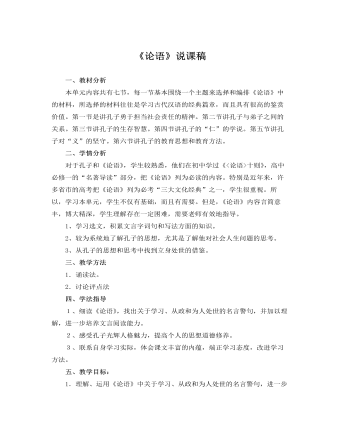
人教版高中语文必修1《论语》说课稿
三、文本中的句子解决完毕,大家对文本内容的理解更加深入了。请速度文本,思考:《论语》具体涉及了哪些方面的内容,体现了孔子什么观点?明确:主要有治学、从政、修身养性和交友治道等方面,体现了孔子“克己复礼”的思想。四、 教师引导学生讨论: 如何评价孔子的言行和观点?从古至今人们对孔子有哪些评价?明确:1、春秋战国时代, 孔子门人及其后学者均推尊孔子。门人中以子贡为代表,他对孔子赞美备至,奉如天人,把孔子比拟为高天、日月、木铎,凡人是永远不可企及的,认为孔子是天生的圣人,“仰之弥高,钻之弥坚”。亚圣孟子认为孔子所行的“圣人之道”是遍及自然界和社会的至高准则。然而当时民间一般看法认为孔子是博学成名的大学者。
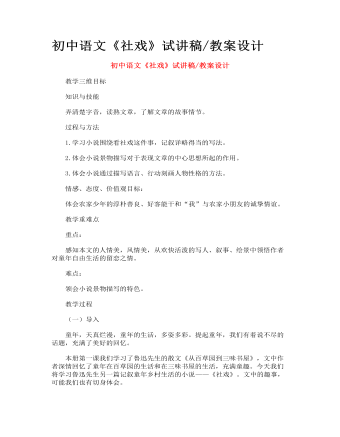
初中语文《社戏》试讲稿_教案设计
1 . 品味文章重点词语、句子或段落。 指导学生找出自己认为精彩、重要的词语、句子和段落,然后用旁批写下自己的看法。 词语例:“我们已经点开船,在桥石上一磕,退后几尺,即又上前出了桥。于是架起两支橹,一支两人,一里一换,……”“点”“磕”“退”“上”“架”等几个动词,将少年们开船时的动作程序以及合作划船的情状表述得颇为详细,显示了他们熟练的驾船技巧和勤劳肯干的品格,也折射出他们去看戏时的愉快心情。 句子例:“那航船,就像一条大白鱼背着一群孩子在浪花里蹿,连夜渔的几个老渔父,也停了艇子看着喝采起来。”这一句用一个富有童话色彩的比喻,反映了儿童富于幻想的 特点和愉快的心情。写老渔父的喝彩,是通过旁观者的赞美来衬托孩子们的驾船技术。 段落例:月夜行船一段(第11段)的景物描写分别从色彩、声音、视觉、听觉、嗅 觉各个侧面着笔,恰如多重奏管弦曲,给人以十分丰富的感觉,景物的立体感由此产生。
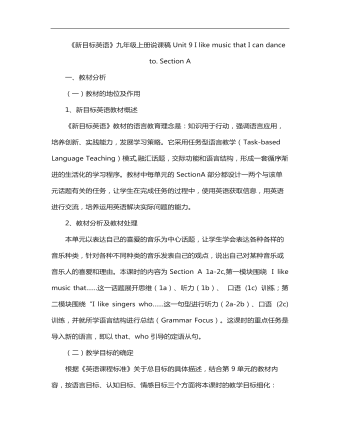
初中英语人教版九年级全册《Unit 9 I like music that I can dance to》说课稿
2、教材分析及教材处理本单元以表达自己的喜爱的音乐为中心话题,让学生学会表达各种各样的音乐种类,针对各种不同种类的音乐发表自己的观点,说出自己对某种音乐或音乐人的喜爱和理由。本课时的内容为Section A 1a-2c,第一模块围绕 I like music that……这一话题展开思维(1a)、听力(1b)、 口语 (1c) 训练;第二模块围绕“I like singers who……这一句型进行听力(2a-2b)、口语 (2c) 训练,并就所学语言结构进行总结(Grammar Focus)。这课时的重点任务是导入新的语言,即以that、who引导的定语从句。

人教版新课标PEP小学英语三年级下册How many说课稿7篇
我随意走动,观察学生们用英语交流的情况,有困难的适时指导一下。学生们在完成任务的过程中,积极运用语言,激发了学习兴趣,同时还实现了与数学学科的渗透和联系。在这节课的最后,我布置了一个有层次的作业,让学生自主选择:①听录音,仿读会话;②分角色表演会话;③改编会话,分角色表演并录成磁带。分层次的作业,让不同程度的学生都能有事可做,都有表现自己的机会,体验到成功的喜悦,同时使学生的语言交际向课外延伸,使他们能带着动力,保持兴趣继续学习。总之,在这节课的教学设计中,我重视对新知识的铺垫和自然导入,通过多种方式的呈现,让学生们自然而然地学习新知识。充分利用游戏、合作交流等教学手段,让学生们饶有兴趣地操练语言、运用语言,在完成任务过程中巩固知识,运用知识,体验成功的喜悦,培育积极的学习情感,形成良好的学习策略,并将这些积极的因素带人下一步的学习当中。
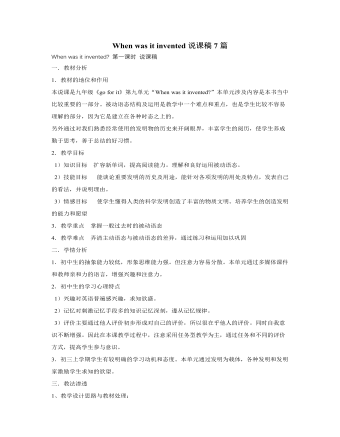
人教版新目标初中英语九年级下册When was it invented说课稿7篇
《新目标英语》中的具体语言目标是通过各种各样的Tasks来实现的;学生需要运用具体而特定的行动来完成一定的交际任务。整个教学过程中,各种语言结构与语言功能与不同的学习任务有机的结合。任务活动所谋求的效果不是一种机械的语言训练,而是侧重在执行任务中学生自我完成任务的能力和策略的培养;重视形式在完成任务过程中的参与和在交流活动中所获得的经验。因此本节课我将始终引导学生通过完成具体的任务活动来学习语言,让学生为了特定的学习目的去实施特定的语言行动,通过完成特定的交际任务来获得和积累相应的学习经验,让学生在用中学,在学中用。 2、教学原则 l 活动性原则 提倡学生主动参与,体验,交流,合作,探究等多种学习。 l 合作性原则 以学生为主体,师生合作,生生合作,体现教与学的互动,交往。 l 任务型原则 任务驱动—激发动机;任务完成—激励学习积极性;执行任务—培养责任 心和合作精神。 l 情感性原则 激发学生学习英语的兴趣和始终保持良好的学习情绪。
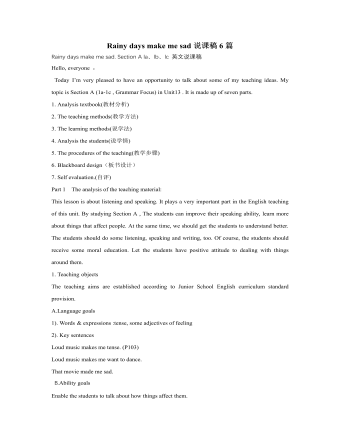
人教版新目标初中英语九年级下册Rainy days make me sad说课稿6篇
Today I’m very pleased to have an opportunity to talk about some of my teaching ideas. My topic is Section A (1a-1c , Grammar Focus) in Unit13 . It is made up of seven parts.1. Analysis textbook(教材分析)2. The teaching methods(教学方法)3. The learning methods(说学法)4. Analysis the students(说学情)5. The procedures of the teaching(教学步骤)6. Blackboard design(板书设计)7. Self evaluation.(自评)Part 1 The analysis of the teaching material:This lesson is about listening and speaking. It plays a very important part in the English teaching of this unit. By studying Section A , The students can improve their speaking ability, learn more about things that affect people. At the same time, we should get the students to understand better. The students should do some listening, speaking and writing, too. Of course, the students should receive some moral education. Let the students have positive attitude to dealing with things around them.1. Teaching objectsThe teaching aims are established according to Junior School English curriculum standard provision.A.Language goals 1). Words & expressions :tense, some adjectives of feeling 2). Key sentences Loud music makes me tense. (P103)Loud music makes me want to dance.That movie made me sad.B.Ability goals Enable the students to talk about how things affect them.Emotion & attitude goals Enable the students to understand the effect of things upon them.

人教版新课标PEP小学英语三年级下册My family说课稿6篇
(1)单词:father (dad), mother (mom), grandfather (grandpa), grandmother (grandma), man, woman(2)学唱英语童谣《Father and Mother》。难点:表示家庭成员单词的认读三、说学情三年级第二学期的学生,能够认读少量简单的单词;但是由于英语不是我们的母语,在日常生活中少于应用,学生学得快,忘得也快,在口语交流能力方面很差。因此,在教学中要结合学生的实际情况,采取有效的教学方法进行教学。四、说教法根据教学内容的特点,我在教学中①注重主题化整体设计,以family为主线贯穿始终,结合远程教育资源的利用,给学生创设一个轻松、愉快的学习氛围。②注重在课堂教学中充分体现“以学生为主体”的教学原则,营造“真实性”的语言环境和开放的空间,让学生在交际中学习运用。③在教学过程中设计各种教学活动,让他们在唱中学,在做中学,在玩中学,从而充分调动其学习兴趣,同时还注重培养学生各项能力训练。五、说学法

人教版新课标PEP小学英语三年级下册Welcome back to school说课稿4篇
2、学生小组间的问答:“Where are you from?”“I’m from…”(根据孩子自己制作的头饰回答)3、请几个小组开火车问答:“Where are you from?”4、教师出示钟表(把时间调到下午):“Good afternoon!”教师带上Mr. Black的头饰(走到一位学生面前)说:“Good afternoon! My name’s Mr. Black. I ’m from China.”孩子根据自己的情况回答:“Good afternoon, Mr. Black. I’m Xiao Dong . I’m from China.”教师提问一组孩子。然后请学生到前面来扮演Mr. Black.5、教师带着Mr. Black 的头饰走到台前,说:“I have a friend in our class. Do you know who’s she?”教师指着扮演Amy的同学说: “This is my friend Amy.”(引导全班孩子问好)Ss: Nice to meet you.A: Nice to meet you, too!Ss: Where are you from?A: I’m from America.Ss: Welcome!6、教师播放Let’s talk部分的课件, 学生观看对话。跟读、模仿,分角色给课件配音。7、小组分角色练习对话。8、小组表演对话。趣味操练 (Practice)1、Listen and order the cards: 将课文图片打乱顺序,让孩子听一听, 摆一摆。2、表演Let’s talk部分的对话。

人教版新课标PEP小学英语三年级下册Where is my ruler说课稿7篇
1、教学内容PEP Primary English BookⅡ Where’s my ruler?第一课时 A. Let’s talk. Let’s practise. C. Culture.2、教材简析本单元的核心教学内容是找东西和借东西的话题与交通工具,学生生活用品的词汇教学及六个字母(Uu Vv Ww Xx Yy Zz)的听、说、读、写。①Let’s talk. 会话学习。本课时通过寻找东西这一情境,学习句型Where is …?及掌握介词in 、on 和under的用法,让学生在模仿、学习表演的基础上达到自然交流和真实运用。②Let’s practise. 会话游戏活动,让学生在游戏中熟练运用所学问句。③Culture. 文化交流,渗透C部分中“六一”国际儿童节的文化内容,并学唱《Happy Children’s Day》。根据小学英语会话循序渐进的特点,此课作为第一课时,为整个单元教学打好基础,作好教学铺垫。同时,在整一个小学英语教学中,作为交际功能的一部分,它也是一个不可或缺的部分。

